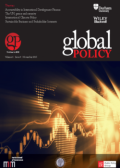A key challenge facing many resource-rich countries is how to mobilize and effectively use volatile revenues from resource extraction, while addressing social and environmental externalities of mining activities. This UN Environment Policy Brief examines how fiscal reforms and other complementary measures in the extractives sector can help generate additional public revenues while reducing some of the negative environmental and social impacts from mining activities. It also explores how these resources can be channelled through a well-governed sovereign wealth fund (SWF) or natural resource fund (NRF) to support delivery of the SDGs.
This report aims to shed light on how EECCA countries and development co-operation partners are working together to finance climate actions, using the OECD DAC database to examine finance flows by provider, sector, financial instrument, channel, etc. A significant amount was committed by international public sources to the 11 countries comprising the EECCA in 2013 and 2014 (i.e. USD 3.3 billion per year), but the scale of such finance varies considerably from country to country and is insufficient to achieve and strengthen their climate targets communicated through the Intended Nationally Determined Contributions COP21.
In addition, while a range of climate-related policies have already been developed by the EECCA countries, the extent to which such policies are being effectively implemented and conducive to attracting climate finance is still unclear. In this respect, this report proposes a set of questions for the EECCA countries to self-assess their readiness to seize opportunities to access scaled-up climate finance from various sources: public, private, international and domestic.

The concept of a ‘green economy’ has risen to prominence in recent years. However, little has been said about what actors could drive its widespread adoption at the global level. At present, global governance generally occurs in distinct policy domains or ‘silos’; the global environment and the global economy are segregated. Within these domains, authority is highly fragmented among numerous institutions. However, two particular institutions have the broad scope and potentially the capacity to coordinate and steer green economy efforts: the United Nations Environment Programme (UNEP) and the Group of Twenty (G20). This article examines why some (including UNEP itself) have called for the G20 to take a greater role in steering the green economy and assesses the extent to which it has done so. The article concludes that the G20 was ineffective in promoting a ‘green recovery’ from the Global Financial Crisis (GFC) and has similarly failed to stimulate ‘green growth’. Reform of both the G20 and UNEP could improve global policy on the green economy, but changes to the G20 would likely have a greater impact.
As the world moves on from the climate agreement negotiated in Paris, attention is turning from the identification of emissions reduction trajectories—in the form of Nationally Determined Contributions (NDCs)—to crucial questions about how these emissions reductions are to be delivered and reported within the future international accounting framework. The experience to date shows that, if well designed, emissions trading systems (ETS) can be an effective, credible, and transparent tool for helping to achieve low-cost emissions reductions in ways that mobilize private sector actors, attract investment, and encourage international cooperation. However, to maximize effectiveness, any ETS needs to be designed in a way that is appropriate to its context. This Handbook is intended to help decision makers, policy practitioners, and stakeholders achieve this goal. It explains the rationale for an ETS, and sets out a 10-step process for designing an ETS – each step involves a series of decisions or actions that will shape major features of the policy.
The Urban Green Growth in Dynamic Asia project explores how to promote green growth in cities in Asia, examining policies and governance practices that encourage environmental sustainability and competitiveness in a rapidly expanding economy. This synthesis report presents the results of case studies along with practical policy recommendations, reflecting the local contexts of Southeast Asia. While Southeast Asian cities are affected by a range of economic, infrastructure, environmental and social challenges, ongoing rapid development offers opportunities to shift towards greener growth models. The concept of urban green growth can be a powerful vector of sustainable development, by emphasising the existence and potential of co-benefits between economic and environmental performance.
